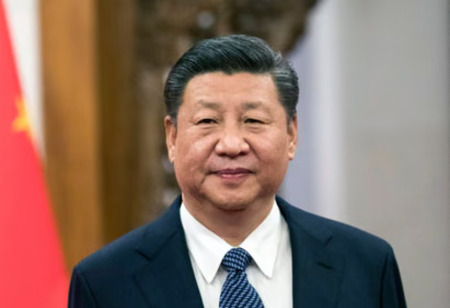
Xi’s Red Line on Trump’s Export Curbs Threatens to Upend Truce

 China's President Xi Jinping has established a firm boundary to counter fresh US export restrictions, risking the renewal of retaliatory trade conflicts with Donald Trump mere weeks ahead of a scheduled summit between the leaders of the two largest global economies.
China's President Xi Jinping has established a firm boundary to counter fresh US export restrictions, risking the renewal of retaliatory trade conflicts with Donald Trump mere weeks ahead of a scheduled summit between the leaders of the two largest global economies.
Following China's announcement of comprehensive international export restrictions on items containing even minimal amounts of specific rare earth elements this week, Trump responded by threatening to call off a proposed face-to-face meeting with Xi — marking what would be their first encounter in six years. The American president also revealed intentions to increase tariffs on Chinese products to 100 percent, alongside extensive limitations on "any and all critical software."
Also Read: Unitree CEO Outlines Future of Humanoid Robots
Beijing defended its actions as protective measures while charging the US with implementing fresh restrictive policies aimed at China following discussions between the nations in Madrid during September. The previous month saw the US Commerce Department announce a significant broadening of export restrictions, eliminating gaps in existing policies to prevent Beijing's access to advanced semiconductor technology.
China's resolute reaction demonstrates that both nations remain at odds regarding the conditions of a ceasefire established in May, when they committed to reducing tariffs from rates that had climbed far above 100 percent. While Xi interpreted the deal as a mutual halt on new limitations concerning essential exports or corporate restrictions, the US seemingly regards the ceasefire as confined to lowered tariffs in exchange for unrestricted rare earth magnet supplies.
Also Read: Meet the Showstopper Robots of World Robot Conference 2023
The current concern involves whether both countries can reach another accord before tariffs escalate to points that once more risk initiating broader economic separation between America and China. Financial markets retreated on Friday, with American equities experiencing their most severe decline in half a year, as commodities such as soybeans, wheat, copper, and cotton all dropped in value.
American futures surged during early trading in Asia following the Trump administration's indication on potential willingness to reach an agreement with China aimed at reducing escalating trade disputes, though officials also cautioned that Beijing's newly announced export restrictions posed a significant obstacle to negotiations.
Treasury Secretary Scott Bessent announced last month that both nations would engage in additional discussions in Frankfurt, Germany, prior to the November 10 deadline when the current tariff ceasefire concludes.
Zhou Mi, a leading analyst at the Chinese Academy of International Trade and Economic Cooperation, an institution affiliated with the Ministry of Commerce, stated that "such forceful and one-sided demonstrations of power politics will not succeed in intimidating us."
Each country has maintained opportunities for reducing tensions. Trump's proposed tariffs are scheduled for November 1, just days following an anticipated meeting with Xi during a summit in South Korea. China's newly implemented restrictions will begin enforcement one week afterward, occurring shortly before the current trade agreement preventing tariffs reaching as high as 145 percent comes to an end.
Restrictions on the export of technology and magnets essential for AI development and weapons production remain central issues in trade discussions between these two largest global economies.
Also Read: China Blows Powerful Gusts of its Wind Energy Overpowering Competitors
Following Trump's imposition of 145 percent tariffs on China in April, Xi prohibited American companies from purchasing Chinese magnets, resulting in manufacturing plant shutdowns and widespread concern regarding America's reliance on Beijing for strategically important metals. Should the U.S. president implement additional tariff increases, Beijing might reinstate this prohibition, returning both nations to a competition over which superpower can endure greater economic hardship.
This recent confrontation highlights the challenges facing these two competing nations in achieving a trade agreement. Chinese representatives have allegedly offered a substantial investment proposal to Trump's administration, though such financial arrangements would probably face restrictions under US national security regulations. The consequences might also threaten potential agreements regarding TikTok's American operations, which Congress has previously challenged due to security-related issues.

